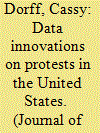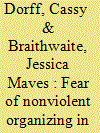|
|
|
Sort Order |
|
|
|
Items / Page
|
|
|
|
|
|
|
| Srl | Item |
| 1 |
ID:
190027


|
|
|
|
|
| Summary/Abstract |
For decades, the United States has been generally excluded from cross-national quantitative datasets on the study of collective action and political resistance. More recently, however, new data collection efforts are on the rise. These projects specifically focus on gathering granular level information about street protests and mobilizations in the United States. In this article, we conduct a rigorous exploratory data analysis of three contemporary protest datasets. These data collect information about the when, where and how of contentious politics in the United States. Our thorough data review first summarizes the key similarities and differences across the datasets. Next, we review the regional, temporal and methodological strengths and weaknesses of each dataset both individually and in contrast to one another. Last, we examine potential research applications of these data by demonstrating what these data reveal about the risks of protesting in these types of events. We conclude by offering recommendations for data use and future data collection strategies for the study of collective action.
|
|
|
|
|
|
|
|
|
|
|
|
|
|
|
|
| 2 |
ID:
193108


|
|
|
|
|
| Summary/Abstract |
Over the last 12 years, Mexico has become one of the most dangerous places to be a journalist. We examine how this risk-environment influences the content and strategies of reporting at one of Mexico’s most well known national newspapers, Reforma. We argue that as the risk environment worsens, journalists use less specific language about armed actors to report on violent events. To test our claims, we turn to three novel sources of data: the first captures granular information about attacks against journalists, the second uses natural language processing to measure changes in reporting overtime; and the third incorporates interviews from journalists themselves. We show that as violence against journalists increases, news story specificity decreases. Importantly, our findings reveal the ways in which journalists develop protection strategies to ensure high quality reporting, even under risky conditions and highlight the critical link between risk and information environments in areas of protracted violence.
|
|
|
|
|
|
|
|
|
|
|
|
|
|
|
|
| 3 |
ID:
160475


|
|
|
|
|
| Summary/Abstract |
What drives perceptions of fear regarding nonviolent mobilization? We investigate whether this fear is more acute in certain segments of society, or whether such concerns are randomly distributed across the population. We anticipate that civilians living in proximity to armed resistance groups are especially afraid of being targeted if they organize nonviolently against insecurity in their community. Using original survey data from Mexico in early 2014, we examine civilian perceptions of risk associated with nonviolent action. Quantitative analyses provide support for our expectation that civilians living in proximity to armed vigilante groups are more fearful of participating in nonviolent action. This suggests that organizers of civil resistance in Mexico (and similar conflict environments) would do well to consider the challenges posed by civilian vigilantism when seeking to mobilize civilians and selecting specific nonviolent strategies for high-risk constituencies.
|
|
|
|
|
|
|
|
|
|
|
|
|
|
|
|
| 4 |
ID:
154849


|
|
|
|
|
| Summary/Abstract |
Previous literature has shown a link between violent victimization and pro-sociopolitical behavior. This study asks why victimization is shown to increase the likelihood of political participation in regions of ongoing armed conflict. I argue that previous answers to this question have overlooked a key variable for predicting civilian behavior: individual-level social context. As a step forward in connecting social networks to behavior outcomes, I present the kinship network as a novel measure for proxying an individual’s valuable and private social interactions. Building on previous victimization literature, I suggest that to comprehensively understand the effects of victimization, scholars should account for social context. Specifically, I examine the hypothesis that as kinship ties strengthen, victimization positively influences the likelihood of political participation. To test this argument, I turn to the Mexican criminal conflict. I use original survey data of 1,000 respondents collected in July 2012 from the ongoing drug war in Mexico, and in doing so, I find that kinship plays a key role in motivating political participation during armed conflicts in that survivors of criminal violence with strong ties to kinship networks are the most likely to participate in political groups; these results are robust to state-level fixed effects and are unlikely to be driven by victimization selection bias.
|
|
|
|
|
|
|
|
|
|
|
|
|
|
|
|
| 5 |
ID:
165326


|
|
|
|
|
| Summary/Abstract |
This essay argues that the study of civil conflict has predominantly focused on the collective actions of violent, armed nonstate actors. By overlooking the role of nonviolent actions during war, war-like environments, or contexts of prolonged political crises, research has also overlooked one of the ways in which civilians can influence trajectories of violence. Accordingly, this essay argues that, if researchers on both sides of the peace-conflict divide integrate dynamics of nonviolent resistance into their research, then the study of civilian-led nonviolent efforts could be one key way to build a bridge between the study of conflict and the study of peace.
|
|
|
|
|
|
|
|
|
|
|
|
|
|
|
|
|
|
|
|
|